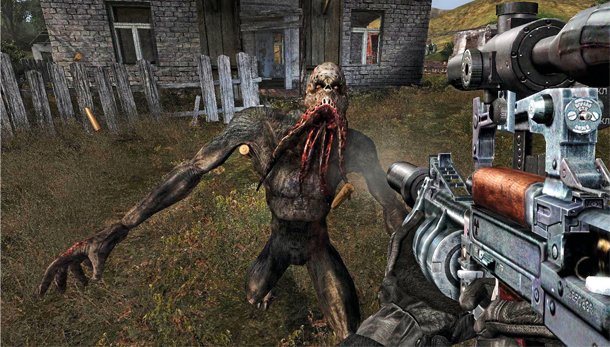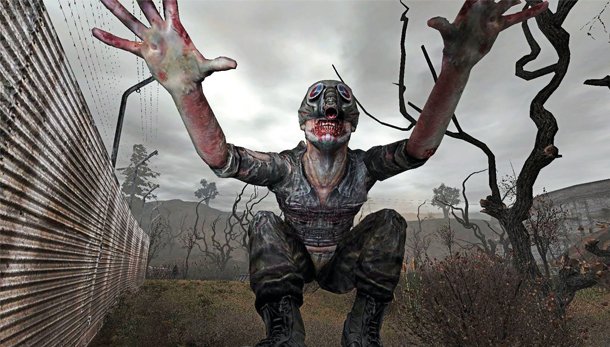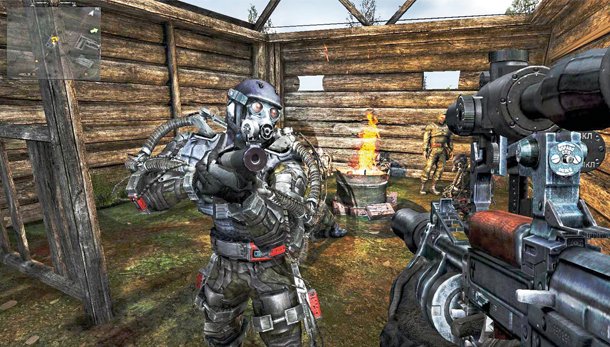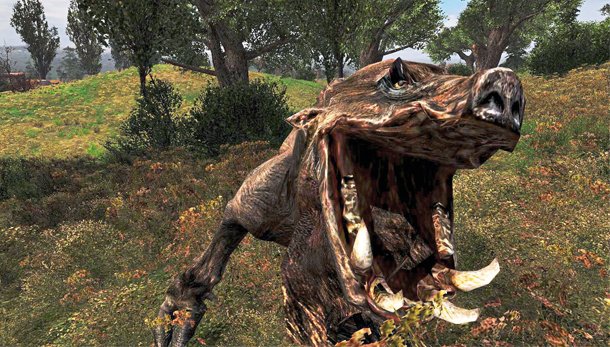Stalker: Shadow of Chernobyl was one game where finding gear never felt mundane
Reinstall.

Reinstall invites you to join us in revisiting classics of PC gaming days gone by. This time, Chris returns to the haunted, irradiated wastes of Stalker: Shadow of Chernobyl.
It's one thing to feel an overwhelming sense of dread while crouching in the darkened sub-basement of an abandoned lab at the stroke of midnight. It's quite another to feel just as uneasy in the middle of an empty field with the sun directly overhead.
Stalker: Shadow of Chernobyl certainly has its share of jump-scares and oh-shit monster moments, but what makes it so memorable is that the neck-tightening tension never evaporates, even in broad daylight, far from claustrophobic chambers full of mutants. The sense of dread is like white noise: pervasive and constant. It begins with the sombre tones of the menu music and doesn't end until long after the quit to desktop.
The key to sustaining this feeling throughout SoC is that Stalker never lets you feel like an invincible superhero. There are a few RPG elements: artefacts that boost health or increase resistance to radiation, more accurate weapons to collect, and sturdier stalker suits to buy. But unlike most RPGs, no matter how many missions I've completed, no matter how deep I've gone into the Exclusion Zone, I've never really stopped feeling like an entry-level employee, easily spooked and exceedingly vulnerable. I've simply died too many times to ever stop jumping at my own shadow, and my deaths, be they at the hands of other stalkers, the claws of mutants, or the violent invisible clutches of the Zone's reality-bending anomalies, have all been the same: sudden, brutal, and seemingly indifferent to my upgraded weapons and fancy new armour.
This is not a world in which to fire from the hip, expecting to take down a crowd of enemies. A well-placed bullet can cripple a player; a perfectly-placed one can kill. The silhouette of something moving on the horizon is cause to drop into a crouch and pull out your binoculars. Is it human? Good. Well, not good, but potentially not bad. It might be a bandit, or a Monolith member, or even a zombie, all of whom are bad news. But there's a chance it's just another stalker, out exploring the Zone, the same as you.

While other stalkers don't have much in the way of personalities—I could give you the names of a few, but no real descriptions—they're still an important part of the atmosphere. Their general lack of interest in you serves as a reminder that you're no grand hero, no saviour of the Zone, but just another random scavenger who is not to be trusted. Their wariness informs you of their own feelings of dread and distrust: walk up to another stalker with your weapon out and he'll bark a warning in Russian, and then translate it by sticking the barrel of his own gun in your face.
So dangerous and inhospitable is the Zone, the only welcome sound is that of distant gunfire. It's the only sound I run directly toward, rather than crouch in fear of. It means that whatever is lurking out here, be it man or mutant, has blessedly decided to attack someone else. Plus, after a fight there will be bodies to loot, bodies I did not have to personally slay. Any time I can collect a few bullets without expending some of my own is a big win.
The biggest gaming news, reviews and hardware deals
Keep up to date with the most important stories and the best deals, as picked by the PC Gamer team.

Few games have made looting as essential as SoC. A few crusts of bread, an extra bandage and some anti-radiation meds make a gruesome firefight worth the effort, because no matter how long you've been playing, no matter what gear you've amassed, these few items can mean the difference between life and death. And isn't that the best part of any RPG? The early days, when every rubbish bin holds a treasure? Here, that feeling never goes away. To a stalker, newbies and veterans alike, every stash, no matter how meagre, is like Christmas Day.
Even travelling in places I'm completely familiar with is no cause for confidence or cockiness, due to the random nature of the stalker and monster encounters that drizzle each session with unscripted surprises. While slowly and carefully picking my way through a cluster of anomalies, I'm startled to have one suddenly burst into a spray of blood just beside me: an invisible bloodsucker I hadn't detected had lunged for me, stepping into a gravity field I avoided but it did not. Of course, the explosion scares me so much I sprint directly into another anomaly, which roughly yanks me around for a few moments before depositing my broken corpse on the grass.
Earlier in the day, I'd approached a military cordon where a soldier began soliciting a bribe to allow me passage. Suddenly, while mid-sentence, he drew his weapon and began firing in my direction. I instinctively whipped out my shotgun and started blasting right back at him. It turned out to be a simple misunderstanding: he'd been firing at a group of boars that had charged up behind me during our conversation. Moments later, the boars were dead, he was dead, and his fellow soldiers had made sure I was dead too.

When death catches up to you in SoC, it's accompanied by the saddest, most hopeless words to ever appear on the screen of a videogame: not The End, not You Died, but Lost in the Zone.
The epitaph fits perfectly. It is accompanied by the image of my body crumpled on some desolate hillside or crushed in the corner of a dark basement, and leaves me with the thought that someday I might be found by a wandering stalker who will root through my belongings, relieving me of my better weapons and my three diet sausages. Maybe my name will come up around a campfire now and then: "Whatever happened to The Marked One, anyway?" one stalker will ask in Russian. A shrug from a second stalker. "He went out one day, and never returned. Lost in the Zone." A third says nothing, but strums moodily on his guitar.

Chris started playing PC games in the 1980s, started writing about them in the early 2000s, and (finally) started getting paid to write about them in the late 2000s. Following a few years as a regular freelancer, PC Gamer hired him in 2014, probably so he'd stop emailing them asking for more work. Chris has a love-hate relationship with survival games and an unhealthy fascination with the inner lives of NPCs. He's also a fan of offbeat simulation games, mods, and ignoring storylines in RPGs so he can make up his own.

